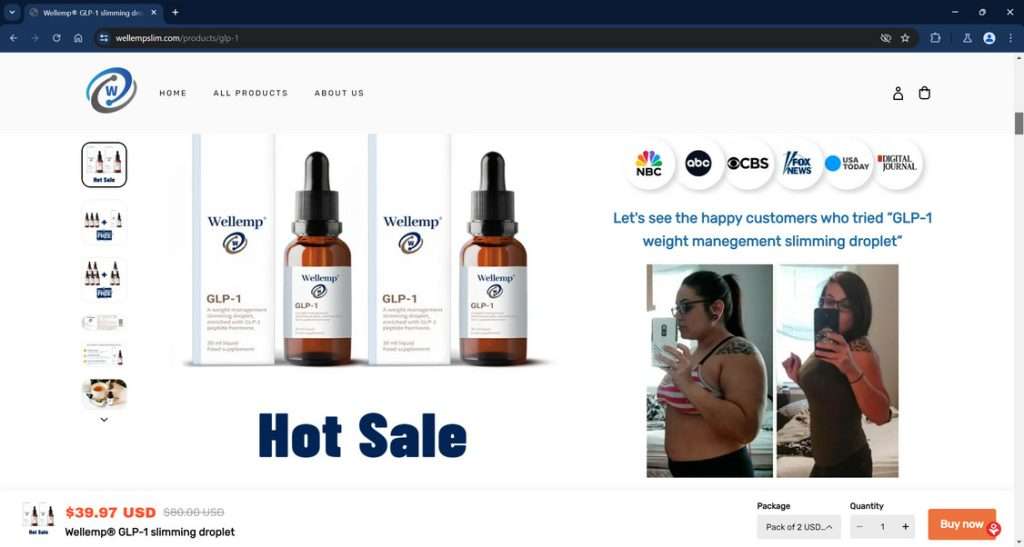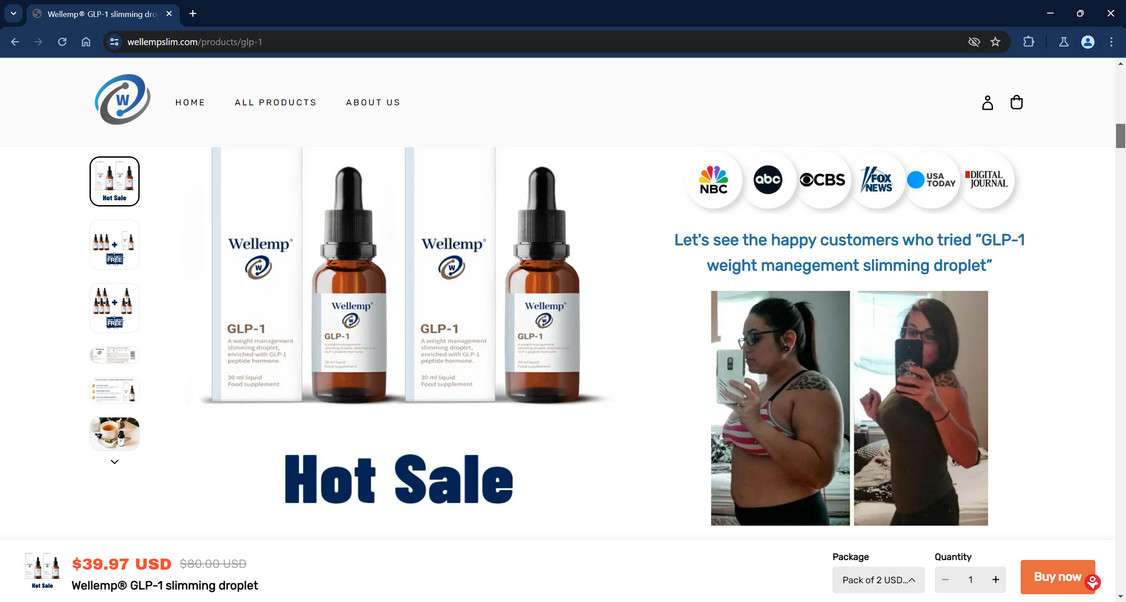Wellamps GLP-1 has exploded in popularity online, marketed as a revolutionary liquid weight loss supplement. However, a closer look reveals this product relies on sketchy marketing tactics and unsubstantiated claims. This in-depth exposé will analyze the questionable practices behind Wellamps GLP-1 and why consumers should exercise caution.
- Introduction to Wellamps GLP-1: Miracle or Marketing Ploy?
- Analyzing the Dubious Marketing Claims for Wellamps GLP-1
- The Alarming Use of AI Deepfakes to Fabricate Celebrity Endorsements
- Analysis of Customer Reviews: Does It Actually Work?
- Frequently Asked Questions
- The Bottom Line: Don’t Waste Money on This Sketchy Supplement

Introduction to Wellamps GLP-1: Miracle or Marketing Ploy?
Wellamps GLP-1 is advertised as a dietary supplement that contains glucagon-like peptide-1 (GLP-1), a hormone that helps regulate blood sugar and appetite. The websites selling this product boldly claim their product offers an easy way to “lose up to 5 pounds per week” without diet or exercise.
GLP-1 does show potential for obesity treatment when administered as an injection or infusion under medical supervision. However, evidence is lacking on the efficacy and safety of oral GLP-1 supplements like Wellamps.
Despite no proof their specific formula works, the makers of Wellamps GLP-1 market it aggressively across social media and wellness blogs. This article will analyze the questionable tactics behind this product and whether it delivers on its promises.
Analyzing the Dubious Marketing Claims for Wellamps GLP-1
The marketing for Wellamps GLP-1 relies heavily on dubious strategies and unproven assertions. Let’s examine some of the main claims and why they seem unreliable.
Claim: “Clinically Proven” to Promote Weight Loss
The Wellamps website and advertisements state their formula is “clinically proven” to aid weight loss through appetite suppression. However, they provide no evidence of clinical trials specifically on their product.
No peer-reviewed studies validate that Wellamps GLP-1 in its current form effectively promotes weight loss. The limited research on oral GLP-1 supplements shows mixed results at best.
Without proof from controlled clinical trials, the “clinically proven” claim appears unsubstantiated.
Claim: “Potent Fat Burning” Effects
Wellamps also asserts their GLP-1 drops have potent thermogenic fat burning abilities. They claim the formula “melts away stubborn fat” by increasing metabolism.
In reality, evidence that oral GLP-1 supplementation significantly increases fat metabolism or energy expenditure is weak. Any boost in metabolism from GLP-1 is likely marginal at best.
Once again, specific clinical data is lacking to support these strong fat burning claims.
Claim: Rapid Weight Loss Up to 5lbs Per Week
One of the most dubious claims by Wellamps GLP-1 is that it causes rapid weight loss of “up to 5 pounds per week.”
However, no studies confirm using GLP-1 orally leads to such drastic short-term weight reduction. At most, research on prescription GLP-1 drugs like liraglutide demonstrate average weight loss of 10-15 pounds over 3-6 months – not per week.
Promising such exaggerated, unrealistic results appears highly questionable.
The Alarming Use of AI Deepfakes to Fabricate Celebrity Endorsements
One of the most deceptive and unethical marketing tactics used by Wellamps GLP-1 is the creation of deepfake videos showing celebrity endorsements. Multiple big-name stars have been exploited in these AI-generated fakes.
Specifically, Wellamps has released social media ads depicting Oprah Winfrey, Rebel Wilson, Christina Aguilera, and John Goodman all seemingly promoting and raving about the benefits of their supplement.
In the deepfake videos, these celebrities claim Wellamps GLP-1 caused them to lose significant weight and gush about how it’s a “miracle fat-burning product.” There are even fake talk show interviews with the stars where the host discusses their weight loss success with Wellamps GLP-1.
However, all of these are complete fabrications produced with deepfake technology. Not one of these celebrities has ever endorsed or even used Wellamps GLP-1. The real Oprah, Rebel, Christina, and John had nothing to do with these ads.
Oprah in particular has been vocal over the years about never promoting weight loss products. Yet Wellamps unscrupulously plastered social media with deepfakes of Oprah praising their supplement against her will.
No shortcuts exist for real weight loss. Improving health requires legitimate lifestyle changes, not supplements like Wellamps.
Wellamps GLP-1 has been also investigated by Jordan Liles on his YouTube channel, where he offers a detailed video on the subject. We recommend watching his video also.
Next, let’s see what other online reviews say about this product.
Analysis of Customer Reviews: Does It Actually Work?
Looking past the bold marketing claims, what do real customers say about their experiences using Wellamps GLP-1?
Online reviews paint a very different picture than the website’s assertions:
- “This GLP-1 stuff is a total scam! Took it for a month and lost zero weight.”
- “I was skeptical but desperate to lose weight. Wellamps didn’t do anything except give me headaches and make my wallet lighter.”
- “No appetite or weight loss effects whatsoever after 2 weeks of use. Wish I hadn’t wasted my money on this garbage.”
- “Complete rip-off. I heavily regret buying into the hype around this product.”
Overall, the majority of customer feedback indicates the product simply does not work as advertised. Users report no significant weight loss, appetite suppression, or other claimed benefits.
This lack of real-world results casts even further doubt on the science and efficacy behind Wellamps GLP-1.
Frequently Asked Questions
1. Is Wellamps GLP-1 safe?
The safety of Wellamps GLP-1 is highly questionable. With no clinical trials on the specific formula, the short and long-term effects are unknown. The doses are undisclosed and absorption unlikely with oral ingestion. Lack of third party testing also raises safety concerns. Consumers have reported concerning side effects like headaches. Overall, no evidence confirms this supplement’s safety.
2. How does Wellamps GLP-1 cause weight loss?
Wellamps claims their product causes weight loss through appetite suppression, increased fat burning, and other mechanisms. However, no credible scientific evidence backs up these assertions. No peer-reviewed clinical studies validate Wellamps GLP-1 actually causes significant weight reduction. Oral GLP-1 supplements generally show minimal efficacy for obesity at best.
3. What ingredients are in Wellamps GLP-1?
The website selling this product does not disclose the full ingredient list or doses. They claim the formula contains GLP-1 and chromium picolinate. However, the concentrations are unknown and no third party verification exists. This lack of transparency makes it impossible to properly evaluate the formula. The additional ingredients are also not proven for weight loss.
4. Do celebrities really use Wellamps GLP-1?
No, the websites selling this product deceptively use deepfake AI technology to fabricate endorsements from celebrities like Oprah Winfrey, Rebel Wilson, and Christina Aguilera. This is outright illegal and these celebrities have never used or promoted Wellamps GLP-1 in reality. All celebrity endorsements are falsified.
5. Are the reviews for Wellamps GLP-1 real?
Many of the raving reviews for Wellamps GLP-1 across social media appear artificially generated. Red flags include suspicious accounts with no history, cookie-cutter posts, and inconsistent before/after photos. Genuine customer feedback is overwhelmingly negative. The positive reviews are likely fabricated through shady marketing tactics.
6. Is Wellamps GLP-1 FDA approved?
No, Wellamps GLP-1 is not approved by the FDA. As a supplement, it does not undergo the same rigorous testing and oversight as an approved drug.
The Bottom Line: Don’t Waste Money on This Sketchy Supplement
In summary, Wellamps GLP-1 provides no credible proof that it safely and effectively aids weight loss. The shady websites selling this product rely on dubious marketing claims that lack scientific substantiation.
Rather than wasting money on this questionable supplement, those seeking to lose weight are better off focusing on lifestyle changes like:
- Adopting a nutritious, calorie-controlled diet
- Increasing physical activity
- Working with qualified healthcare providers
- Beware of “miracle” weight loss products with outlandish claims.
Wellamps GLP-1 provides no compelling evidence it lives up to its bold marketing assertions. Save your money and look elsewhere for science-backed weight management options. Don’t become the next victim of this sketchy weight loss scheme.
This article is for informational purposes only and should not be relied upon for financial or business decisions. We identify potential scams using research, user experiences, and expert analysis. However, all claims should be independently verified. Mistakes may occur, and legitimate products could be flagged. We strive for accuracy but make no warranties regarding the completeness or reliability of the information.
If you are the owner of the website or product in question and wish to offer clarifications regarding your business or website, please reach out to us via our Contact form.


